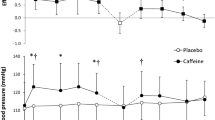Abstract
Subjective and physiological effects of caffeine were investigated via a 3×2×3 design that assessed independent and interactive effects of instructions (told caffeine versus told no caffeine versus not told whether beverage contained caffeine), actual beverage content (caffeine versus no caffeine), and time after ingestion (15, 30, and 45 min). Instructions affected altertness at 15 min after ingestion. Caffeine increased alertness at 30 min after ingestion and systolic blood pressure at 30 min and 45 min after ingestion. A highly significant instruction by drug interaction on tension was obtained at all measurement points, indicating an increase in tension only among subjects who knowingly received caffeine. Because people are generally informed of drug content in non-research settings, these data challenge the external validity of typical double-blind studies, in which subjects are informed of the possibility of receiving a placebo as part of the consent procedure.
Similar content being viewed by others
References
Faden RR, Beauchamp TL (1986) A history and theory of informed consent. Oxford University Press, New York
Fillmore M, Vogel-Sprott M (1992) Expected effect of caffeine on motor performance predicts the type of response to placebo. Psychopharmacology 106:209–214
Hughes JR, Gulliver SB, Amori G, Mireault GC, Fenwick JF (1989) Effect of instructions and nicotine on smoking cessation, withdrawal symptoms and self-administration of nicotine gum. Psychopharmacology 99:486–491
Kirsch I, Weixel LJ (1988) Double-blind versus deceptive administration of a placebo. Behav Neurosci 102:319–323
Lane JD (1983) Caffeine and cardiovascular responses to stress. Psychosom Med, 45:447–451
Lane JD, Williams RB (1987) Cardiovascular effects of caffeine and stress in regular coffee drinkers. Psychophysiology 24:157–164
Marlatt GA, Rohsenow DJ (1980) Cognitive processes in alcohol use: Expectancy and the balanced placebo design. In: Mello NK (ed) Advances in substance abuse: behavioral and biological research, JAI Press, Greenwich, CT, pp 159–199
Penick SB, Fisher S (1965) Drug-set interaction: Psychological and physiological effects of epinephrine under differential expectations. Psychosom Med 27:177–182
Penick SB, Hinkle LE (1964) The effect of expectation on response to phenmatrizine. Psychosom Med 26:369–373
Reinsenzein R (1983). The Schachter theory of emotion: two decades later. Psychol Bull 94:239–264
Rickels K (1986) Use of placebo in clinical trials. Psychopharmacol Bull 22:19–24
Robertson D, Frölich JC, Carr RK, Watson JT, Hollifield JW, Shand DG, Oates JA (1978) Effects of caffeine on plasma renin activity, catecholamines and blood pressure. N Engl J Med 298:181–186
Schachter S, Singer J (1962) Cognitive, social and physiological determinants of emotional state. Psychol Rev 69:379–399
Wigmore ST, Hinson RE (1991) The influence of setting on consumption in the balanced placebo design. Br J Addict 86:205–215
Author information
Authors and Affiliations
Rights and permissions
About this article
Cite this article
Kirsch, I., Rosadino, M.J. Do double-blind studies with informed consent yield externally valid results?. Psychopharmacology 110, 437–442 (1993). https://doi.org/10.1007/BF02244650
Received:
Revised:
Issue Date:
DOI: https://doi.org/10.1007/BF02244650




